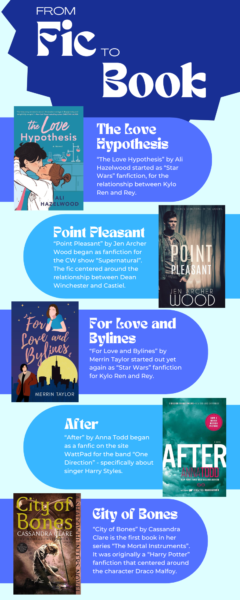They live among us, hiding behind usernames and colorful profile pictures. Scouring the depths of the internet for more content of their favorite universe. Amazingly crafted and intensely addicting places. This is a tale of the dramatic and seldom discussed world of fanfiction, and those who write it.
Fanfiction is quite literally what it sounds like—fictional stories written by fans of a certain TV show, movie, or book series. It’s a hobby that is easily accessible for anyone who wants to do it, because all you need is an idea and some characters that you love, which makes the popularity of this craft spread.
“When most people think of fanfiction they think of character shipping or inappropriate things, but not all fanfiction is that.” Jane* said. “A lot of it is pretty good, well written works. It just depends where you’re looking.”
Despite the seemingly large following, fanfiction is something that not everyone likes to admit that they read or write. Like with any creative hobby, it can be nerve-racking to put your work out there, a fear that anonymous internet usernames fix. Fanfiction also tends to get somewhat of a bad reputation, due to the fact that it isn’t written by “real” authors, and that it borrows pre-existing characters. Not to mention the stereotype of fanfiction only being cringey self-insert stories involving a relationship between the reader and a fictional or even real person, or inappropriate stories with no real plot, which isn’t the case. All of this adds up to create a harmful stigma around stories that are supposed to just be fun for fans, causing many to not want to admit to writing or even reading them.

However, there are still many reasons why fans would gravitate towards fanfiction, becoming almost addicted to the stories and fun alternate universes (AUs) that people create. Some want to show their appreciation for their favorite piece of media, and others want to imagine a scenario between characters that never happened. Universes that writers will put characters in are more than just the worlds they already come from, they can be anything—from putting Harry Potter and Draco Malfoy in a coffee shop setting that panders to the enemies to lovers trope, leaving readers anxiously awaiting the next update, to the angst-filled stories between Steve Harrington and Eddie Munson from Stranger Things that can be emotionally devastating depending on the ending, or even the more absurd ones combining World War II and the anime Haikyuu. Writers and readers alike love to mess around with different ideas, and chances are, there is an alternate universe for practically anything you can think of.
“When I want two characters to meet, or I want to imagine what would happen if an event did or didn’t happen, I look to fanfiction.” Jane* said. “I’ll go find someone who actually wrote that thing, and I just end up getting really into it.”
Once something is written, the real fun begins, and people can upload their story on one of the fanfiction websites. The most well-known sites are Archive of Our Own (Ao3), WattPad, and Fanfiction.net, though the majority of users tend to turn to Ao3, according to the user visit number per month of 357.4 million to WattPad’s 142.5 million.
“If I actually want to read decent things, I go to Ao3,” John* said.
One thing about Ao3 is that unlike other sites that host fics is that it was created for fans by fans. It was originally an idea discussed in a LiveJournal post in 2007, but by the next year, it was created, and later opened as a beta site in 2009. The popularity only skyrocketed from there, and currently, the website has around 11,770,000 works for over 60, 260 fandoms, and it’s not stopping anytime soon.
Writing these stories can also be great practice for writers growing their voice. Many notable published authors such as Marissa Meyer, author of the book series The Lunar Chronicles, and Meg Cabot, author of The Princess Diaries have opened up that they began their writing journey through this practice. In more recent years, it has become more common for new authors to publish their fic and change the names of the characters, which is a process called “filling off the serial numbers”. Books such as The Love Hypothesis by Ali Hazelwood and the After series by Anna Todd were written with this method. Hazelwood’s book started out as Star Wars fanfiction for the ship between Rey and Kylo Ren, and Todd’s beginning as Harry Styles fanfiction.
Fanfiction has also been around for a lot longer than many may seem, the actual term simply wasn’t coined in print until 1939. These early stories are dated as far back as the 1700s, beginning with Jonathan Swift’s book Gulliver’s Travels, which started many fan-authored works such as a series of poems by Alexander Pope involving the relationship dynamic between Gulliver and his wife. This was a very common practice that happened back then, and many well-known stories, even some read in schools like Lord of the Flies by William Golding and Shakespeare’s Romeo and Juliet would be considered fanfiction by today’s times for borrowing characters from previous pieces of media.
Through anything the internet may throw at it, fanfiction is a constant in our society that will live on as long as writers keep on working on their craft. It gives millions of fans across the globe the ability to connect and bond over their shared fandom, as well as an outlet for their emotions through writing.
“I originally got into fanfiction as a way to release some of my hyperfixations onto something, rather than rereading the same book,” John* said.
Past its surface of surprisingly long stories often about two characters who didn’t end up together in their piece of media, it’s an expression of absolute love and devotion to someone else’s creations, which in itself can be beautiful.
*names changed for privacy














